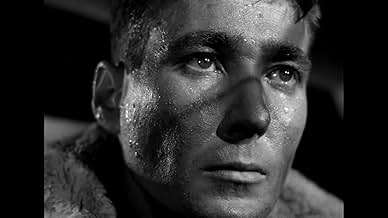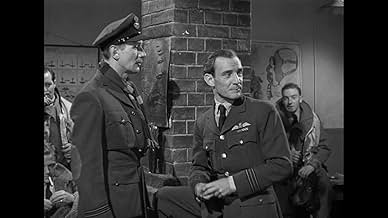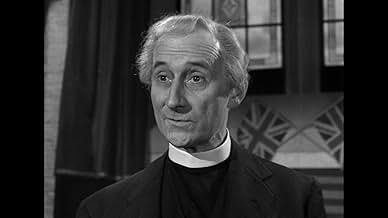The Way to the Stars
- 1945
- 1 घं 49 मि
IMDb रेटिंग
7.3/10
1.7 हज़ार
आपकी रेटिंग
अपनी भाषा में प्लॉट जोड़ेंThe wartime daily routine on a British bomber base in southeastern England is revealed through the eyes of newly arrived Flying Officer Peter Penrose (Sir John Mills).The wartime daily routine on a British bomber base in southeastern England is revealed through the eyes of newly arrived Flying Officer Peter Penrose (Sir John Mills).The wartime daily routine on a British bomber base in southeastern England is revealed through the eyes of newly arrived Flying Officer Peter Penrose (Sir John Mills).
- पुरस्कार
- कुल 1 नामांकन
Renée Asherson
- Iris Winterton
- (as Renee Asherson)
Bonar Colleano
- Joe Friselli
- (as Bonar Colleano Jnr)
Nicholas Stuart
- Col. Rogers
- (as Tryon Nichol)
Bill Owen
- 'Nobby' Clarke
- (as Bill Rowbotham)
कहानी
क्या आपको पता है
- ट्रिवियाThe poem "For Johnny" read by Sir John Mills is as follows: "Do not despair, For Johnny-head-in-air; He sleeps as sound, As Johnny underground. Fetch out no shroud, For Johnny-in-the-cloud; And keep your tears, For him in after years. Better by far, For Johnny-the-bright-star, To keep your head, And see his children fed."
- गूफ़Both footage clips of the B-17 landing, and later in flight show that the film has been reversed. This is easily spotted as the aircraft codes and fin unit identification letter are back to front.
- भाव
Squadron Leader Sil Carter: Well, chaps, as you know the target for this afternoon is exactly the same as yesterday's, and the day before yesterday's, and the day before that. Calais. Barge concentrations.
- क्रेज़ी क्रेडिटThe end credits play over a night sky showing a crescent moon and many stars.
फीचर्ड रिव्यू
The Way to the Stars begins on a downcast and flat footed note, a rather downbeat and dreary voice over as the camera sweeps its way through an old airfield long since abandoned. The voice is nostalgic, the tone full of regret and longing for the days of old. The camera nervously approaches the air field, as if afraid to go in, but does so and creeps around looking at markings on the wall; individual shelves and what-not that's still around. The year is 1945, and The Second World War is over; at least until the film triumphantly darts back to 1940 to a resounding chorus and tremendous score: hark, a plane in the RAF lands to a merry tune and all seems right again with activity and action clogging up the screen as busy bodies dart around and planes come and go. Despite this description, this is not a film that longs for conflict during times of war; rather the interaction and sense of togetherness it believes war brings out in people as they fight the cause. The opening tone in the aftermath of the mammoth event that was WWII suggests alienation, a sense of "where do we go from here?" Back in the day, The War was on; everyone knew their duty and would bond – we realise that the film doesn't miss The War itself, but rather the unity and relationships that formed out of The War as relics from days of old are ruefully lingered on.
In making The Way to the Stars, director Anthony Asquith has crafted a war film not entirely about the death and destruction of that time but the good that comes out of pulling together and forging certain relationships. Would young pilot Peter Penrose (Mills) have met young Iris (Asherson) had The War not been on?; would young American pilot John Hollis (Montgomery) have bonded with public house owner Miss Todd (John) had The War not been on? Would she be the same person after The War had she not gone through what she experienced with a certain flight lieutenant? Certainly not, in fact one moment much later on sees both Hollis and Todd share a moment in which they reflect on the implausibility of Americans visiting the exact setting they share under normal circumstances. But that's not to say it doesn't remember the war dead entirely, despite channelling (through Asherson's character) a sense of romping on with business; that despite loosing her husband of two years to The War, the film disallows her to grieve too heavily and instead places her on a path that sees her continue her role to play upstanding hostess and fuel the local pilots with escapism in the form of alcohol and unity, as well as later interaction with said American.
The film is a really well observed character piece; focusing on and manifesting a number of relationships in and around both a local airfield which houses Allied bombers and a public house named The Golden Lion. In 1940, all sorts of Royal Air Force members retain that fighting spirit and keep their chins up as German bombing threatens the air field and general area. The men are unperturbed, taking cover and keeping spirits high by nattering about menial things to distract themselves in that manner most films of the era had them positively presented. The presentation of masculinity, particularly in those between a young and middle age is mostly positive and upbeat with a young graduate has an opportunity to lie to a senior about some test scores but concedes to the truth another pilot is seen to help out in the kitchen of that local pub-come-hotel as he woos the owner with poetry.
Hounesty; resilience; an eye for the arts and always keen to lend a helping hand is the order of the day as these positive masculine traits are played out under a banner of strength through teamwork and ability to both connect and link with those of other cultures. For a film about men and male pilots; female character Miss Todd is impressively given a fair share of development; while young, initially snappy Penrose attempts to court a young woman named Iris are thwarted by her domineering aunt, a resident at the hotel, who'll have nothing of it if it means veering too far away from her. Penrose's arc will see him initially adopt one of the lead roles, something we were led into believing may have been Todd's husband, a certain David Archdale (Redgrave), who's in charge of the airmen before marrying and being granted a fairer share of screen time. Penrose is then is allowed to develop from a young hot-head into a calmer, more rueful and thoughtful young man more-so by way of the effects of the war on the home and those around him than any 'action' he saw overseas.
The film has a little more fun when the Americans arrive in '42, respectfully shifting tracts from loss of a friend and lover to a more comedic tone running on a clashing of cultures in detailing the differences in sports, beverages and sandwich fillings these two sides share. Their obvious initial ill-fitting to the locale exemplified in their upsetting of the 'old guard' in Iris' elderly aunt when she fails to connect with the young American pilots and their leisurely habits. That's not to say they're limited to alienated clowns though, as a certain Johnny Hollis will go on to take a rather predominant role; he himself alienated away from home and here rendering the piece not of a wholly begging ilk destined to highlight how solely bad the British had it. Through Hollis, the idea is that nationality is immaterial. In restricting his servants of The War to bombers and bombardiers, Asquith is reliant on how the effects of missions affect the life back home on the ground and in this sense, succeeds, culminating in a worthy effort that's worth seeing.
In making The Way to the Stars, director Anthony Asquith has crafted a war film not entirely about the death and destruction of that time but the good that comes out of pulling together and forging certain relationships. Would young pilot Peter Penrose (Mills) have met young Iris (Asherson) had The War not been on?; would young American pilot John Hollis (Montgomery) have bonded with public house owner Miss Todd (John) had The War not been on? Would she be the same person after The War had she not gone through what she experienced with a certain flight lieutenant? Certainly not, in fact one moment much later on sees both Hollis and Todd share a moment in which they reflect on the implausibility of Americans visiting the exact setting they share under normal circumstances. But that's not to say it doesn't remember the war dead entirely, despite channelling (through Asherson's character) a sense of romping on with business; that despite loosing her husband of two years to The War, the film disallows her to grieve too heavily and instead places her on a path that sees her continue her role to play upstanding hostess and fuel the local pilots with escapism in the form of alcohol and unity, as well as later interaction with said American.
The film is a really well observed character piece; focusing on and manifesting a number of relationships in and around both a local airfield which houses Allied bombers and a public house named The Golden Lion. In 1940, all sorts of Royal Air Force members retain that fighting spirit and keep their chins up as German bombing threatens the air field and general area. The men are unperturbed, taking cover and keeping spirits high by nattering about menial things to distract themselves in that manner most films of the era had them positively presented. The presentation of masculinity, particularly in those between a young and middle age is mostly positive and upbeat with a young graduate has an opportunity to lie to a senior about some test scores but concedes to the truth another pilot is seen to help out in the kitchen of that local pub-come-hotel as he woos the owner with poetry.
Hounesty; resilience; an eye for the arts and always keen to lend a helping hand is the order of the day as these positive masculine traits are played out under a banner of strength through teamwork and ability to both connect and link with those of other cultures. For a film about men and male pilots; female character Miss Todd is impressively given a fair share of development; while young, initially snappy Penrose attempts to court a young woman named Iris are thwarted by her domineering aunt, a resident at the hotel, who'll have nothing of it if it means veering too far away from her. Penrose's arc will see him initially adopt one of the lead roles, something we were led into believing may have been Todd's husband, a certain David Archdale (Redgrave), who's in charge of the airmen before marrying and being granted a fairer share of screen time. Penrose is then is allowed to develop from a young hot-head into a calmer, more rueful and thoughtful young man more-so by way of the effects of the war on the home and those around him than any 'action' he saw overseas.
The film has a little more fun when the Americans arrive in '42, respectfully shifting tracts from loss of a friend and lover to a more comedic tone running on a clashing of cultures in detailing the differences in sports, beverages and sandwich fillings these two sides share. Their obvious initial ill-fitting to the locale exemplified in their upsetting of the 'old guard' in Iris' elderly aunt when she fails to connect with the young American pilots and their leisurely habits. That's not to say they're limited to alienated clowns though, as a certain Johnny Hollis will go on to take a rather predominant role; he himself alienated away from home and here rendering the piece not of a wholly begging ilk destined to highlight how solely bad the British had it. Through Hollis, the idea is that nationality is immaterial. In restricting his servants of The War to bombers and bombardiers, Asquith is reliant on how the effects of missions affect the life back home on the ground and in this sense, succeeds, culminating in a worthy effort that's worth seeing.
- johnnyboyz
- 2 मई 2010
- परमालिंक
टॉप पसंद
रेटिंग देने के लिए साइन-इन करें और वैयक्तिकृत सुझावों के लिए वॉचलिस्ट करें
- How long is Johnny in the Clouds?Alexa द्वारा संचालित
विवरण
- रिलीज़ की तारीख़
- कंट्री ऑफ़ ओरिजिन
- भाषा
- इस रूप में भी जाना जाता है
- Johnny in the Clouds
- फ़िल्माने की जगहें
- The Golden Lion Hotel, 114 High Street, Northallerton, North Yorkshire, इंग्लैंड, यूनाइटेड किंगडम(exteriors of village pub)
- उत्पादन कंपनी
- IMDbPro पर और कंपनी क्रेडिट देखें
- चलने की अवधि1 घंटा 49 मिनट
- रंग
- पक्ष अनुपात
- 1.37 : 1
इस पेज में योगदान दें
किसी बदलाव का सुझाव दें या अनुपलब्ध कॉन्टेंट जोड़ें


































